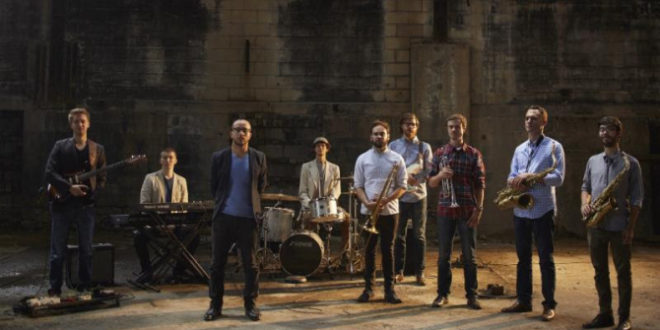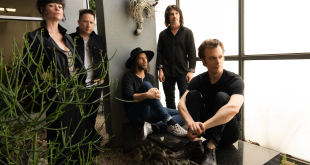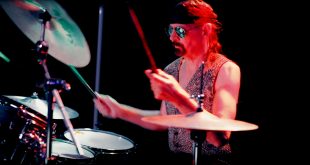On Thursday, the Get Down for Refugees concert series will go on at New York City’s Mercury Lounge. This funk and soul based showcase is utilized to benefit the International Rescue Committee, a top organization providing assistance to refugees, both Stateside and internationally.
Chicago-based nonet Bassel and the Supernaturals will be the event’s headliner. The band is fronted by Bassel Almadani, a Syrian American long involved with philanthropic aid toward the people of Syria. Additionally, Almadani has personal ties to the country, his extended relatives having been victims of its war-ridden conflict.
In preparation for the Mercury Lounge gig, I caught up with Bassel to discuss his real-time recollection of pre-war Syria, his musical endeavors, as well as our means of societal progress amidst political unrest. Ultimately, we must utilize a familial aesthetic toward our peers that comprises patience, humility, and respect.
ME: I want to start off talking about your formative time in Syria. To Noisey, you’d mentioned spending your summers in Aleppo, playing soccer in the streets with your cousins. Could you tell me more about the things that resonated with you about the city of Aleppo, prior to the war?
Bassel: It was a bustling city with millions of people—an amazing place with so much happening. It’s the oldest continuously civilized city in the world, which is fascinating. So, the history around you was just unlike anything you’d ever experienced. I mean, here in the States, we see things that are a hundred years old, and we think, “Woah, history (laughs)!” But over in Aleppo, everything is thousands of years old. The whole city is built around one of Salaheddine’s several citadels, from the time of the crusades, and it was beautifully intact—a UNESCO World Heritage site. It was memorizing. Every time you went to go see it, you felt like you were stepping way back in time. Lots of amazing experiences, so much history, and deep appreciation for the city of Aleppo.
ME: From your experience, it’s clear that the Aleppo is a huge contrast from what it once was.
Bassel: Without a doubt. A good chunk of the city is now completely devastated at this point. All its historical sites have been targeted. Those that have withstood thousands of years of conflict are now being destroyed after all of this. People aren’t comfortable walking in the streets, or even at home. What used to be this intensely vibrant city with people working their tails off everywhere is now much quieter—much more nervous.
ME: Nearly all your extended family reside there. I’m wondering, do you have a close-knit bond with your family?
Bassel: Absolutely. Family is everything in Syria; it’s deeply embedded within the culture. In the States, our culture is very work-centered. But in Syria, your social interactions with family and friends are above everything. Every night that we were there, it was a dinner with 10, 15, 20, 30 people (laughs)! We’d go out, play cards, smoke some hookah, or whatever it may be—just enjoy life. Yeah, I have a very close bond with my family. It was always a joy spending time with them during the summer.
ME: You were based in America once the war began, right? Understandably, there’s a sense of guilt that stems from not being physically there for your family. When the news first hit, did you feel a numbness that turned into guilt after a while, or were both sensations hit you at the same time?
Bassel: Yeah, I guess it sort of progressed. The Arab Spring was already in full force; it just didn’t seem like it would touch Syria. Nobody there really anticipated that. When the news had hit, there was an urge to treat it as a one-off incident here and there, and hope peace would come through it. This all started with peaceful demonstrations. We were all just hopeful that the government would listen, and that there was an easy path just extending some of the basic human rights people deserved. They were very reasonable demands, and calls for the government to step down. It wasn’t until the protests turned violent—because the government attacked the people—that those calls began.
My feelings definitely weren’t immediate because it hadn’t sunk in that this would turn into all-out war. But as things progressed and started impacting my family directly, it took on a whole other turn. Yeah, there was a lot of guilt associated with that, and sending over money to keep the lights on, provide food and medical care. So many people were in the streets near our home, who needed attention. It only helps so much as you can use the money like a band-aid. That’s when I’d upped the ante and took on more of a strategic engagement, through music, speaking, and trying to create a positive change that would impact this for the long term.
ME: Another moment of impact was your moving to Chicago. You had this revelation about songwriting, and were influenced by artists like Otis Redding, Stevie Wonder, and Marvin Gaye. From what I can surmise, though, it was less about the soul music as a whole, and more so simply finding veritable artists you could identify with?
Bassel: I think it’s a little bit on both sides there. What drew me to those artists was that soulful connection to their music, and their ability to communicate a message through tone, lyrical context, and body language. That really resonated with me, you know? Those artists were relevant during some racially tense times, and wrote and performed music that brought people together all over the world. Just listening to that and watching documentaries, you can tell how deep of an impact this music had. While we praise civil rights leaders and those in political movements, we can’t shy away from the influence these artists have had on people to take action and care. Yeah, it goes deeper than appreciating those artists; it’s the way they communicate their message.
ME: With all these influences you’d accumulated with time, how did this transition into your current band, Bassel and the Supernaturals?
Bassel: Well, I moved to Chicago as a songwriter. I grew up in Ohio, and was really into this indie folk realm. It wasn’t until I moved to Chicago that I fell for those artists and became inspired by my environment. From there, it started with meeting some horn players, and having a deep appreciation for saxophone, trumpet, and trombone. The layers they’d added to the music just fascinated me.
So, it was first kind of experimental, then through those connections, they were just really meaningful. That led to interactions with a lot of people in the soul, funk, and jazz communities in Chicago. It was realizing that these musicians are some of the best out there. They work their tails off and get better every day. It wasn’t about the ‘dream’ of hitting the ‘big’ stage that kept them moving, more than their love for music and improvisation—always keeping the show interesting, and striving toward that. That’s what gravitated me toward the musicians I work with today—their love for music and what it is, and being involved with something that’s beautiful and interesting. And, here we are a couple years later!
ME: Your new album that’s out, Elements, deals directly with the way in which both you and your loved ones were affected by the war. Were there any songs during the writing process that you felt especially compelled to get out first?
Bassel: Yeah! “Lost” was a key song, because the context of it relates to the loss of a family member in Syria—my cousin. But on a deeper level, that song addresses the very idea of loss, and I felt this was something that people could access. Everybody eventually experiences that in some way or another, whether it’s someone very close to them, or something near and dear. It creates this cycle of emotions, sense of chaos, frantically looking over and over, and not knowing how to handle it until you’re forced to find resolve. I felt people can access that internationally; it’s something we all have to cope with. It was a powerful experience writing that song—very groovy, but with a darkness to it and a lot of layers. I was really excited in getting that song out.
ME: How do you feel about the album’s ultimate outcome?
Bassel: I feel incredible about it all. This record was a huge challenge I’d set for myself. To keep it funky and groovy, but also directly hit on some heavier subject matters in a way that didn’t feel forced, that we can perform it in a festival, college, or intimate setting. It would still have a high impact no matter where we are.
I think we really accomplished that with this record. It does feel very deep, and the stories are very rich and palatable. We took time to create music that told a story; it’s not just lyrically relevant as much as it is the music and the colors that the lyrics are shaped out of. Yeah, I’m really proud of how this record came out. Even though we’d recorded it more than two years ago, it still feels exciting, and gets better and better every time; it never goes stale.
ME: What I get out of it, is the stark contrast between the laid-back fluidity of the musicianship, and the otherwise dark, intense subject matters.
Bassel: Wow, I like that. I mean, it’s definitely not one thing throughout the entire album. I feel like Elements is an appropriate title because, in a direct way, we’re talking about water, fire, earth, sand—various elements that exist in the world. Also, the natural order of the world is all over the place, and we go from a beautiful, sunny day to skies opening out of nowhere and pouring rivers. It’s unbelievable, and takes turns that we would never expect. I felt like it was important to recreate that, and build a cohesive record around those things.
ME: In conjunction with music, you’d long been involved with activism—first with Amnesty International, then with this upcoming benefit show, Get Down for Refugees, at Mercury Lounge. How did you originally get involved with the benefit?
Bassel: This was actually very short notice for us. The show had already come into fruition with the band Futuretype, who’s headed out this event. We were touring in the days before and after it already. We’re going to be in Harrisburg [Pennsylvania] on Wednesday, and then we’re heading back west starting on Friday. New York was about as far as the direction I was interested in going. I was poking around just a few weeks ago, just to see if there was a potential opportunity for us on short notice. I was also looking at an event for July, so, this is a chance we’ll be coming back and doing an event after Syria as well. Through that, I’d just stumbled across this and it just felt perfect.
I immediately reached out to the organizer of the event, and within 24 hours, we’d jumped on the bill. It just made so much sense to be part of this. So, for us, it was relatively short notice, but it had already been in the works for a while.
ME: Would you consider this a milestone, not only in your band’s career, but in your personal growth?
Bassel: Yeah! We’re consistently doing events that have a humanitarian undertone, and collaborating with different organizations that are providing for this cause one way or another. I’ve been coming through New York usually two or three times a year, and we’re performing about that much. There’s so much talent left and right in New York. With our South by Southwest experience, and the curators of that being largely from New York, it just provided a door into the state that allowed it to feel like a second home.
So, coming off South by Southwest, and going to Mercury Lounge through the team at the Bowery, it’s a big step. We’ve been in touch with them for a while, and it seemed as if the world was sending us signs with this event (laughs)! It was a good move for us and our message. I’m thrilled about it, and I bet it’s going to lead to some awesome opportunities in New York. I’m coincidentally in New York on Thursday, and then in May, June, and July. It’s fast becoming a second home, since I’m not usually there for four consecutive months. I’m happy to see that being the case (laughs!)
ME: Even after this work, there’s still much to be done. By large, the outcome of the presidential election has divided us further as a nation. What is your take on this, from a personal standpoint?
Bassel: Whether it relates to Syria, refugee policy in the US, or the travel ban, there’s an ongoing hostility that exists right now. This country has a lot of bigoted ideologies that have suddenly been given national platforms, and seeming like an okay view. Things are very difficult to digest, and we can’t afford to stay quiet. I get frustrated when I meet friends that just push it off and say it’ll be done after four years. Personally, when I hear some of the things being said about the Arab and Muslim communities, I haven’t experienced this level of hatred since 9/11. It feels like we’re undoing a lot of this work and progress that we’ve made to come together as a people since then.
This whole tour is all part of what I’ve been calling the Resist tour. I mean, it’s not like we’re actively with our fists up and getting people to scream. There is such thing as a peaceful resistance, and building positive relationships with people. This tour has taken us into the heart of Wichita, Kansas, Tulsa, Oklahoma, and Lincoln, Nebraska—a lot of these cities where people maybe don’t confront a lot of Syrian or Muslim people. We make it a point to be present, to tell a story that feels personal and relatable, and to bring people closer to this issue by involving them, and creating that story for them. I think that step is compassion, in one word. It’s loving your neighbor, and trying to work together to make the world a better place by caring. Not just turning the news off when it gets frustrating.
ME: In essence, the goal is to be open with one another. Even if it feels uncomfortable at first, you stick to your gut and make that move.
Bassel: Yeah, without a doubt. Especially right now, you’d get a lot of mixed emotions—or reactions—when you’re marketing yourself as a Syrian with this message. We had a nice feature on PRI go up like last week, and its headline was “Syrian American Solo Artist Takes His Music to Trump Country.” Of course, you’ll have people respond positively, but then there are people on the other side that’ll be like, “Woah, what the hell is ‘Trump’ country? Get that out of here; we don’t want anything to do with that. It all stems from xenophobia—this whole fear of somebody coming in and messing up the way things are.
When you hear stories about Syrian refugees and their experiences here in the states, you could quickly tell. They don’t want handouts. They don’t even want to be here. They’re forced into a circumstance where they’d had to escape their home, and their ultimate goal is to go home. It’s in everyone’s best interests to equip them with the tools they need to steer their future, you know? They’re not here to affect our agenda, and they’re bashful about it. They’re modest about their presence here in the States, and they’re grateful for having a path to get their life back on track. But their eventual aim is to get home.
ME: Lastly, anything you’d like to say to your fans?
Bassel: More than anything, this is such an important time for us. It’s interesting to be able to be a voice—to advocate for a political issue. But I’m just grateful to be one of those voices of 11 million people how are just not being heard otherwise. This issue is above and beyond us. The fact that we have this opportunity to create a voice on this issue is substantial. To have a conversation with so many people who are otherwise not engaged, our demographic is very diverse. I think this is an unbelievable time for us to tell a story that will make an impact. I just urge people to be part of the family, make noise with us, and enjoy this peaceful resistance.
Bassel & the Supernaturals Socials:
 Music Existence Because of Music, We Exist
Music Existence Because of Music, We Exist


